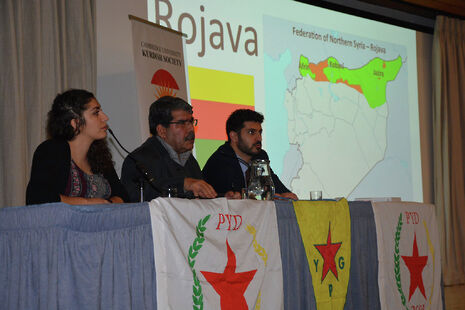Kurdish leader blasts University for lack of action on Turkey
Salih Muslim, co-chair of the PYD in Northern Syria, spoke to the Cambridge University Kurdish Society at St Johns on Monday

On Monday evening, students, staff and members of the public gathered in the Fisher Building of St John’s College to listen to one of the foremost figures in Kurdish and Syrian politics. The visit, hosted by Cambridge University Kurdish Society, took place against a backdrop of increasing tensions between Turkey and its Kurdish population.
Salih Muslim is the co-chair of the Syrian Kurdish Democratic Union Party (PYD) in Northern Syria, an area known by the Kurds as Rojava. Since 2012, its residents have been pioneering a system of ‘Democratic Confederalism’, a “radical democracy project” based on the grassroots government of secular, multi-ethnic communities.
During his speech, which was also attended by a Senior Proctor of the University, Mr Muslim spoke of his hopes that politicians from his party, and its armed wing, the Popular Protection Units (YPG), could “liberate all of Syria from the regime” of Bashar al-Assad. He stressed the need for the “mentality to be changed”, and the introduction of a democratic federalist system in which Syria’s many ethnic groups could peacefully coexist.
This system could be modelled on many of the traits of Rojava’s government, he proposed, including its promotion of gender equality: “women should have the same voice as men”, he said, adding that “this democratic system could change everything in the Middle East.”
Cambridge has not been untouched by the struggles of the Kurdish nation. In February this year, a Cambridge academic told Varsity about how they feared for their own safety after signing a petition which denounced the “atrocities being committed by the Turkish state against the Kurds”. The academic received death threats and was forced to cancel their plans to return to Turkey after President Erdoğan vilified the petition’s signatories as “traitors”.
However, speaking to Varsity, Barzan Sadiq and Dilar Dirik, the event’s organisers, explained that Western governments cannot claim moral superiority in such cases. Citing the European Union’s recent deal with Turkey to manage the refugee crisis, and the use of European weapons by the Turkish military, they said “the West is complicit in human rights abuses in Turkey, but those who pay the price are primarily the Kurds and the civil society in Turkey.”
The experiences of members of Cambridge’s own “small Kurdish community” is one of misconception and prejudice. According to Sadiq and Dirik, “students often assume that the individual people they meet in everyday life are Turkish, when in reality these people are Kurdish refugees, often with high levels of education and political histories.”
The event was organised as part of a wider push to raise awareness of the Kurdish issue in Cambridge, which also includes a petition to “show our solidarity with the academics in Turkey who raised their voice against the violent treatment of the Kurds by the Turkish state”.
Sadiq and Dirik lamented the failure of the University community to engage with the Kurdish question, saying that “[we] have not a seen a single action in Cambridge raising concerns about the current war in Turkey, except for demonstrations that we organised." They described it as "outrageous" that it was "so marginally or superficially treated in one of the top universities in the world”.
The day after he spoke in Cambridge, it was revealed that the Turkish government had released a warrant for the arrest of Mr Muslim. Erdoğan’s government alleges that Mr Muslim and other members of his party were involved in the bombing of a military convoy in Ankara in February of this year, which resulted in the deaths of 28 people.
In a statement on Facebook reacting to the news, Dirik wrote: “They can try to arrest Kurdish leaders as much as they want, but the reality is that the seed of Democratic Confederalism has been planted and its flowers are flourishing with the colours of women and multiculturalism around the world.”
 Features / Should I stay or should I go? Cambridge students and alumni reflect on how their memories stay with them15 December 2025
Features / Should I stay or should I go? Cambridge students and alumni reflect on how their memories stay with them15 December 2025 News / Cambridge study finds students learn better with notes than AI13 December 2025
News / Cambridge study finds students learn better with notes than AI13 December 2025 News / Dons warn PM about Vet School closure16 December 2025
News / Dons warn PM about Vet School closure16 December 2025 News / News In Brief: Michaelmas marriages, monogamous mammals, and messaging manipulation15 December 2025
News / News In Brief: Michaelmas marriages, monogamous mammals, and messaging manipulation15 December 2025 Comment / The magic of an eight-week term15 December 2025
Comment / The magic of an eight-week term15 December 2025








